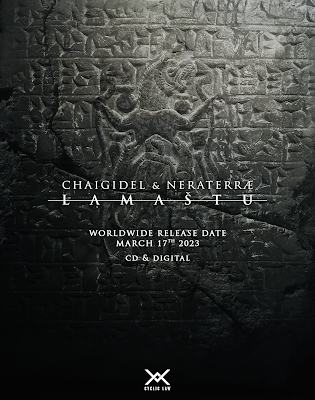The trailblazing Alessio Antoni has shared with me a cavernous-climate triumph, produced by Cyclic Law and promoted under the Chaigidel & Neraterrae banner (i.e., composed by Antoni, behind his guise, Neraterrae, teamed with Mattia Giovanni's Accinni's acclaimed Chaigidel). The experimental outcome is labeled Lamastu.
Like Michael Ferentino's recent masterpiece of the same name, Chaigidel & Neraterrae's Lamastu covers the undercurrent crevasses of the feral, birthing goddess, creating audio scenarios shaken from her allegorical wings. We're talking the venturesome landscapes of Jules Verne, Sir Arthur Conan Doyle and Ruth Rose: tribal patches of the untamed, each ferocious and eclectic.
"Da'at" starts the album as an unadulterated anthem for any chosen Middle-earth or maybe more so, Hollow Earth. It thunders like Kong, to be exact, its hissing-horned ascent accompanying a beast who pushes through trees to grab a maiden fair or if need be, destroy any aggressor who should get in his way. With this stated, "Da'at" is ominous, threatening and as such, an apt intro for the rest of Lamastu's discomposing queue.
"A'Arab Zaraq" counters the colossal base by being imminent within its saber-swiped spot. It's sandy and reedy in aura, etching forbidden paths toward weird, occultist abodes: an audio nightmare that needn't happen within one's mind, but could be found in any crack-house neighborhood, at any misdirected turn.
"Entrails of Souls", however, returns to monstrous exotica. Through implication, it's Temple of Doom or Fuad Ramses during a virginal Blood Feast. Either way, its gutsy construction reimagines "A'Arab Zaraq'"s terrestrial cage, galloping over an innards-spilt stretch that must be heard to be (a-hem) disbelieved.
To instill that disbelief into religious terms, "Mac Benach" welcomes a Gaelic-guru exaltation. Its mean moans and swooning wisps are Svengali-like and highlander transcendental, its chords invoking Stonehenge turbulence, summoned by a sick sorcerer's incantations.
"Purson" is more (person)able, perhaps. That is, it alludes to something human, something common, but reverted to its bestial roots. This track is Moreau-esque, creating shuffling, hybrid noises that only bipedal freaks could make, in a voyage of conundrum from which no pedestrian could dare escape.
Speaking of bestial aftermaths, "Satariel" goes down another tawdry path. This one's tailored to ribbit and does so in reference to Ray Milland and Sam Elliot near a frog-ridden swamp: nature striking back, as it were, rising small and hitting hard. This one sounds eerier than the previous mentioned, for it slithers right in the unassuming pit of one's backyard.
Perhaps my favorite Lamastu track is "Eloi Eloi Lama Sabacatni", which grazes the austerity of "Satariel" and "Purson", but here we have wee, pale people corralled by meaty Morlocks as drums and chimes mock. The composition is timeworn yet futuristic and like the other tracks, occupies frenzied corridors, with steampunked hints that are specialized for the dim, dank and hungry.
"Malkuth" ends the epic, presenting a kingdom of terror from the inside out. "Malkuth" is about possession (and therefore, invasion) via pain-inducing demons like Lamastu: those shrieking, sadistic deities that mess one up and wrack one's soul, that turn one from ecstasy to anguish through trails left best untraveled and maybe, just maybe, unheard.
But Chaigidel & Neraterrae's bewitching Lamastu must be traveled. It must be heard, if only to fortify one's mental mettle; so prick up one's ears and strengthen one's heart. Lamastu calls at
https://www.cycliclaw.com/music/chaigidel-neraterrae-lamashtu-cd-181st-cycle?fbclid=IwAR0ahz7zroK7nU3R0y5M2_JvEGc81MjPv1AkXeBDoJn5V3m1pw21fAQtmDo












No comments:
Post a Comment